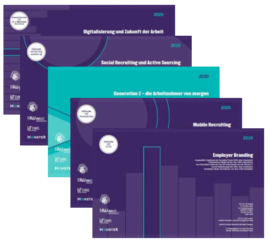The Centre of Human Resources Information Systems (CHRIS), a research association of the Schöller Endowed Chair of Information Systems (Prof. Dr. Sven Laumer) and the Chair of Information Systems (Prof. Dr. Tim Weitzel) at the University of Bamberg, published the new 2020 Theme Specials of the study series Recruiting Trends and Bewerbungspraxis in March. The focus of the study series is on the recruitment practices of the top 1,000 companies in Germany, as well as the behavior and attitudes of the candidates (more than 3,500 were interviewed).
In 2020, the results were summarized in five theme specials, which deal with the following topics. The studies can be downloaded from the project partner, monster.de.
Social Recruiting and Active Sourcing
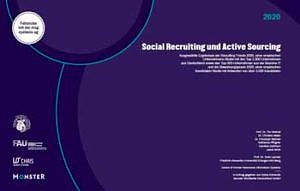 This section analyses the results of the studies “Recruiting Trends 2020” and “Bewerbungspraxis 2020” with a focus on social recruiting and active sourcing. The study deals with the question which recruiting and active sourcing channels are most suitable for recruiting and which channels are used by candidates. Furthermore, the topics of social media, employee recommendations and key figures in the HR area are examined.
This section analyses the results of the studies “Recruiting Trends 2020” and “Bewerbungspraxis 2020” with a focus on social recruiting and active sourcing. The study deals with the question which recruiting and active sourcing channels are most suitable for recruiting and which channels are used by candidates. Furthermore, the topics of social media, employee recommendations and key figures in the HR area are examined.
Digitalization and the Future of Work
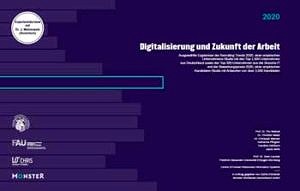 The topic ” Digitalization and the Future of Work” analyzes the results of the studies “Recruiting Trends 2020” and “Bewerbungspraxis 2020” with regard to the digitalization of the recruiting process and the general change of work in the future. Especially this year’s study observes the expectations and challenges of digitization in human resources management, recommender and selection systems, the area of tension between digitization and process standardization as well as upcoming changes in the work and skills of employees. An expert interview with Dr. Jochen Malinowski from Accenture GmbH provides an insight into the practice.
The topic ” Digitalization and the Future of Work” analyzes the results of the studies “Recruiting Trends 2020” and “Bewerbungspraxis 2020” with regard to the digitalization of the recruiting process and the general change of work in the future. Especially this year’s study observes the expectations and challenges of digitization in human resources management, recommender and selection systems, the area of tension between digitization and process standardization as well as upcoming changes in the work and skills of employees. An expert interview with Dr. Jochen Malinowski from Accenture GmbH provides an insight into the practice.
Mobile Recruiting
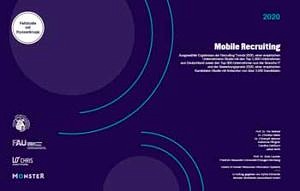 The topic “Mobile Recruiting” analyses the results of the studies “Recruiting Trends 2020” and “Bewerbungspraxis 2020” with a focus on the use of mobile devices such as smartphones and tablets for recruitment and applications. Candidates can apply to companies via mobile devices in various ways (e.g. apps, presentation of websites and forms that have been optimized for mobile devices). The corresponding offer of a professional mobile appearance and corresponding functionalities are necessary for this from the side of the companies.
The topic “Mobile Recruiting” analyses the results of the studies “Recruiting Trends 2020” and “Bewerbungspraxis 2020” with a focus on the use of mobile devices such as smartphones and tablets for recruitment and applications. Candidates can apply to companies via mobile devices in various ways (e.g. apps, presentation of websites and forms that have been optimized for mobile devices). The corresponding offer of a professional mobile appearance and corresponding functionalities are necessary for this from the side of the companies.
Employer Branding
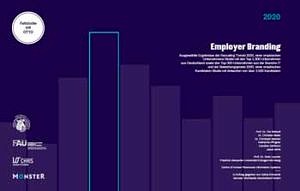 The topic “Employer Branding” analyses the results of the studies “Recruiting Trends 2019” and “Bewerbungspraxis 2019” with a focus on employer branding. Especially topics such as staff requirements, the design of the application process, the best experiences in the application process from the candidate’s point of view as well as employee retention are considered.
The topic “Employer Branding” analyses the results of the studies “Recruiting Trends 2019” and “Bewerbungspraxis 2019” with a focus on employer branding. Especially topics such as staff requirements, the design of the application process, the best experiences in the application process from the candidate’s point of view as well as employee retention are considered.
Generation Z – die Arbeitnehmer von morgen
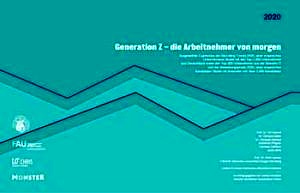 This topic analyses the results of the studies “Recruiting Trends 2020” and “Bewerbungspraxis 2020” with a focus on pupils, trainees and students of Generation Z. The special features of Generation Z with regard to Social Recruiting & Active Sourcing, Employer Branding, Mobile Recruiting as well as Digitization and Future of Work will be presented.
This topic analyses the results of the studies “Recruiting Trends 2020” and “Bewerbungspraxis 2020” with a focus on pupils, trainees and students of Generation Z. The special features of Generation Z with regard to Social Recruiting & Active Sourcing, Employer Branding, Mobile Recruiting as well as Digitization and Future of Work will be presented.
Implementation Details
Bewerbungspraxis
The results presented in the Theme Specials are based on an empirical study with over 3,500 candidates. The study participants were able to participate via the internet between May and August 2019. The underlying survey questionnaire was developed by the CHRIS team based on the results of last year’s study and current conditions and implemented on the website of the Centre of Human Resources Information Systems (CHRIS) at the University of Bamberg. Through the use of banner advertising and several mailings, 3,500 candidates took part in the study. The answers of these participants represent the fundament for the Theme Specials from the perspective of the candidates.
Details on the demographic data of the participants in the study can be found here (external link).
Recruiting Trends
127 of the 1,000 largest German companies took part in the company survey (response rate 12.7 percent) and 32 of the 300 largest companies from the IT sector (response rate 10.7 percent). According to Bisnode’s current database register, the distribution of the sample of the respective study participants is representative in terms of turnover, number of employees and industry affiliation in relation to the respective population.
For details on how the study was conducted, click here (external link).

